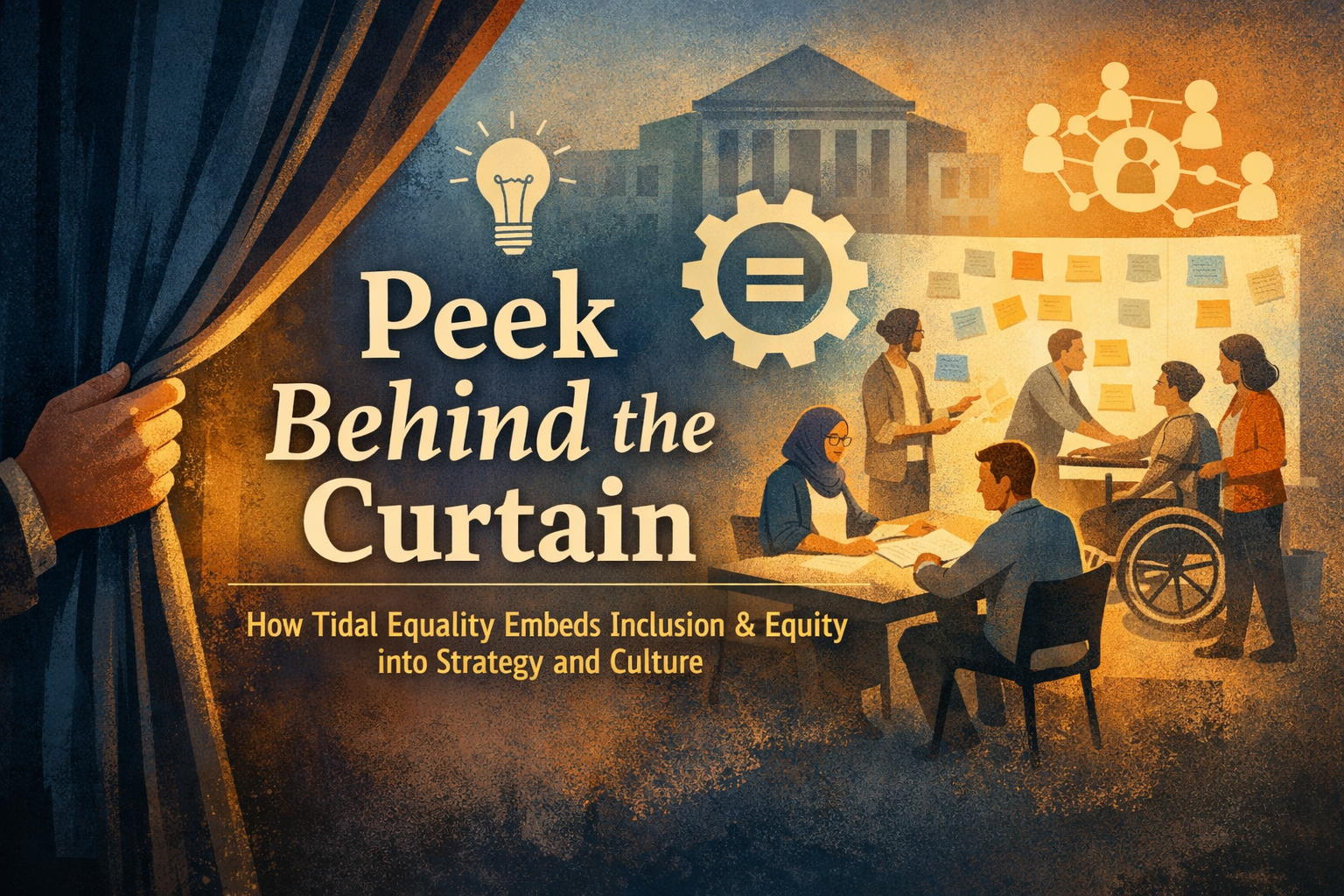Most institutions treat equity like an add-on—something to “consider” after strategy is set and culture is defined. At Tidal Equality, we believe that’s backwards. Equity should shape the process, not just the outcome. This article offers a rare look into how our strategy and culture design work embeds equity into the very structure of decision-making, capacity, and ownership—so inclusion is built-in, not bolted on.
Read MoreWhen leaders say, “We have a culture problem,” they’re often naming the symptoms—not the cause. Silos, tension, fatigue, and defensiveness rarely come from bad people or weak values. More often, they’re what happens when strategy goes missing. When direction is unclear, culture absorbs the strain. This piece is a dispatch from the coach’s notes on how leaders can tell the difference—and respond wisely.
Read MoreThe antidote to organizational anxiety isn’t control, it’s coherence. It’s a return to the we.
Reconnection begins when we help people see that what feels personal is, in fact, shared. That’s when the nervous system relaxes, and collaboration becomes possible again.
Read MoreBudgets are stretched thin, people are working on fumes, and scarcity is breeding distrust. But even in the midst of exhaustion, there’s still room for possibility. When forces pull our workplaces and communities apart, care and connection become our quietest—and most powerful—form of resistance.
Read MoreAt Tidal Equality, innovation isn’t just about creating something new—it’s about making meaningful changes to existing work, processes, and decision-making to ensure they are fairer, more inclusive, and equitable. This broader view of innovation prioritizes reducing bias, barriers, and inequalities to promote fairness and equal opportunity for all. But while the concept of equitable innovation is gaining attention, few organizations have a scalable method for achieving it. That's where the Equity Sequence® comes in—a practical framework designed to guide individuals and organizations in turning equitable ideas into actionable, lasting change.
Read MoreColleges and universities across the U.S. are facing new challenges with the rise of anti-DEI legislation. Entire DEI offices are shutting down, and staff are being let go. But there’s hope. 🌟
At Tidal Equality, we champion ‘equitable innovation’—a strategy to ensure fairness and inclusion despite these setbacks. Equitable innovation involves making decisions that address unmet needs, reduce bias, and break down barriers.
Read MoreAlzheimer’s Society, a UK charity, underwent transformative changes to enhance racial and ethnic inclusion. Fueled by Equity Sequence® training and prompted by global events like the George Floyd protests, the organization adapted its outreach processes and internal hiring strategies. Recognizing disparities in dementia-related services, they embraced innovative approaches, seeking feedback, and fostering inclusivity. This case study showcases their commitment to dismantling barriers, internally and externally, ultimately working towards a more equitable and accessible future for individuals affected by dementia.
Read MoreRead about the impactful journey of the Mohawk Students’ Association (MSA) as they champion equity and inclusion within Mohawk College and nationwide. From their roots in unifying student activities, MSA has become a leader, fostering a sense of belonging for students. Guided by their core values, MSA embraced Equity Sequence®, driving initiatives like establishing a living wage and creating inclusive spaces. The MSA's story resonates as a testament to the transformative potential of equity and inclusion.
Read MoreJess’s case study shows how Equity Sequence®, has the potential to take examples of this kind; of concrete change-making—and multiply them to an exponential degree, toward L.A. City’s goal of “bringing people together—across neighborhoods, ethnicities, generations and ages—to be part of the solution” to the City’s challenges, big and small.
Read MoreFor Tanya, Equity Sequence® is unlocking a puzzle she's sometimes faced in her equity work:
How do you equip people with tool(s) to advance equity, while letting them lead as experts in their field? How do you truly empower others? How do you let them design their own equity interventions, without somehow taking over the reins?
Read MoreEven in what may seem like “lower-stakes” uses of AI, it’s those most often subjected to unjust treatment by inequitable systems who will suffer most and be most harmed.
If you’re a person of Middle Eastern descent misidentified as a terrorist, it’s not low stakes.
If a machine downgrades your ability to get a kidney transplant because you’re Black, it’s not low stakes.
Read MoreMarnie is overseeing a BIG initiative at Busch® Systems. She’s helping create a Project Management Office (PMO). This PMO will serve as a central hub for the company. It will establish guidelines and set ground rules for any future project, large or small.
Yet what struck me was how much of what she described could apply to ANY project, ANYWHERE.
Read MoreInclusive healthcare starts with an awareness that you can’t unsee inequities tied to healthcare once you know about them.
Read MoreThe term “woke” has come to mean alert to racial or social discrimination and injustice, but it seems to instill animosity among some groups. We dive into what wokeism is and why this might be.
Read MoreJust how the balance of power gets tipped can feel like a mysterious thing, even though there are some consistent statistical patterns behind this…
Power and entrenchment of status quo interests can be intractable… until they’re not…
Change seems to stall and stall and stall until suddenly the floodgates open, often to the surprise of everyone…
Read More[W]hat if—when it comes to at least some forms of Indigenous thinking—the concept of rights is the wrong framework altogether?
Read MoreHow do we balance grief, anger—rage, even—with an obligation to move forward? To DO something, be of use, and not let this become “just two more” in an endless string of violent gun massacres?
Read MoreLike so many, we are still processing what it means that people all over America are about to lose a right they’ve exercised - despite varying degrees of burden - for nearly 50 years.
We are processing what it means that, for the first time in U.S. history, a constitutional right is being taken away instead of added—by five people with decision-making power over millions, whose voices, needs, and lived experiences they don’t begin to represent or seem to understand.
Read More“…it’s precisely this concentration of power that an Equity Sequence® mindset challenges you to call into question—whether that concentrated power is brought about by economic policies that increase wealth inequality; by racial or cultural dynamics that breed paternalistic attitudes; by status-worship social habits that foster deference to celebrity gurus as sources of authority; or by elite-educated, tech-bro networks that lead to insular thinking.”
Read MoreTo democracy and social justice watchers, observing this business-as-usual behavior is like watching corporate giants sleepwalk toward the edge of a cliff, dragging with them our hopes for more a democratic, inclusive society—and for more democratic, inclusive organizations—tethered as we all are to their outsized power and influence.
***
At its root, DEI work is, or should be, in my view, a moral endeavor. Its aim should be to nudge, cajole, demand, sometimes even shame an organization into acting on the basis of moral instead of business imperatives. But insofar as business is about making money, generating profit, and maximizing gain—essentially selfish endeavors—its deepest motivation is not to act morally or care about moral choices.
Read More



















